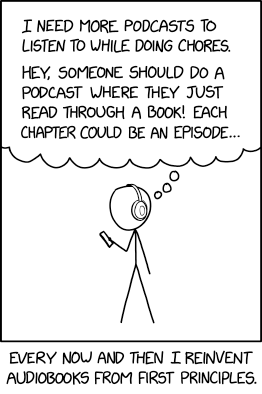Book Podcasts

I've been working my way through this 1950s podcast by someone named John Tolkien called 'Lord of the Rings'--it's a deep dive into this fictional world he created. Good stuff, really bingeable!

I've been working my way through this 1950s podcast by someone named John Tolkien called 'Lord of the Rings'--it's a deep dive into this fictional world he created. Good stuff, really bingeable!
Randall (represented as Cueball) discusses his love of podcasts, episodic audio files of a talk show. He uses them to pass the time when doing chores. At one point he imagines what it would be like if someone made a podcast narrating books, as an easy and convenient way to digest literature when reading the book yourself isn't an option. As spelled out in the caption, he quickly realizes he hasn't invented a new concept but simply described the existence of audiobooks, a product which has existed since well before the concept of podcasts. It's also worth noting that although podcasts usually involve talking and discussions, podcasts that are essentially chapter-by-chapter audiobooks already exist, as do podcasts that are effectively anthologies of shorter stories, meaning that there's nothing remotely original about his idea.
He confesses this has happened more than once, which (as can also be seen in 1367: Installing and 2724: Washing Machine Settings) is not the first time Randall has accidentally reinvented the proverbial wheel for an idea. Though this comic specifically indicates that he has reinvented the audiobook 'wheel' on prior occasions, perhaps approaching the combination of an audio medium and the written word from another direction.
"First principles" are the set of propositions that a method or theory is founded on, and which can not be derived from other theories that exist in the field. Therefore, first principles can't be derived from other propositions. In this case, Randall is describing the first principles of audiobooks by working backwards from a medium that was invented later, and that borrowed elements from the existence of audiobooks. The humor is in this circular reasoning and anachronistic thought process, as true first principles would probably have involved a real life read-aloud session, and as such is an example of reverse-engineering and not first principle deduction.
The title text is an inverse of the joke, with Cueball/Randall seemingly having been listening to the Lord of the Rings audiobook without realizing that this "podcast", which somehow seems to have predated widespread audio devices by being released in 1952, was actually originally a book written by J. R. R. Tolkien. This would likely irritate longtime fans of the book (which humorously, include Randall himself).
The words "deep dive" might be referencing the fact that Tolkien wrote the book with the frame story that he was actually just translating the story which was written by the characters in the story, which might also be a joke regarding the reversal of the writing from first principles to "writing" by translation. In addition to this, in 1952, Tolkien's friend George Sayer recorded Tolkien narrating excerpts from The Hobbit and The Lord of the Rings, later distributed more widely in the 1970s on vinyl records, which this may also be an allusion to.